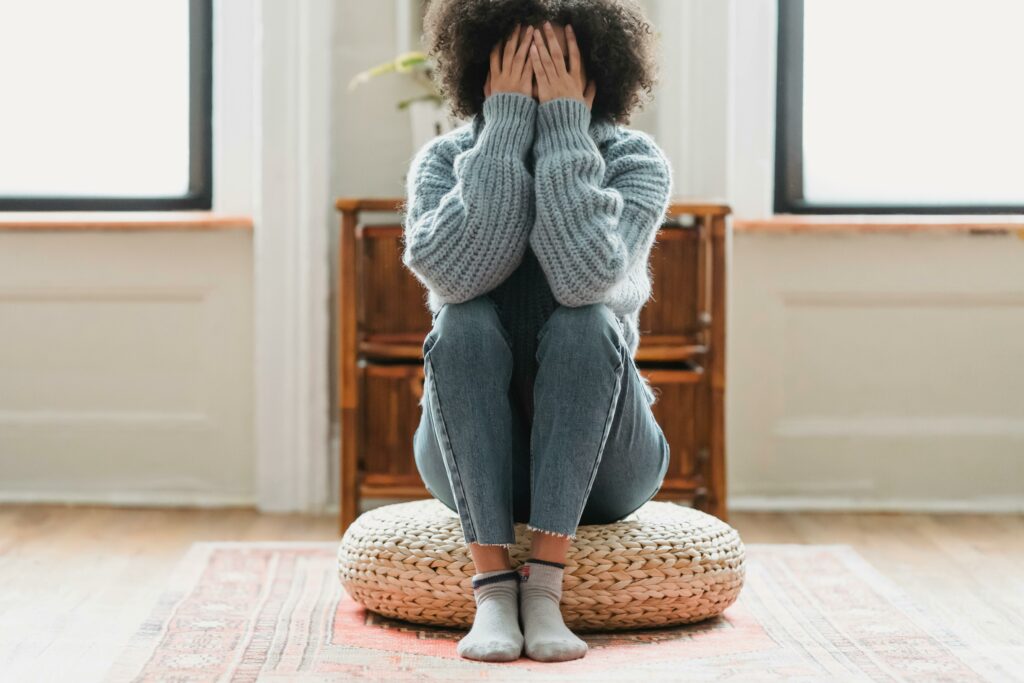A number of mums and dads who have experienced the debilitating impacts of perinatal anxiety and depression are bravely speaking out to encourage parents who may be struggling to seek support in th midst of Perinatal Mental Health Week.
Perinatal depression and anxiety affects 1 in 6 mothers and 1 in 10 fathers, equalling almost 100,000 parents in Australia each year. It ocurs when parents experience depression and/or anxiety during the period from conception until their baby is one year old.
Read their stories below.

Gabrielle Micallef
Postnatal psychosis is a rare but serious mental illness that affects one to two new mothers in every 1000. It is a potentially life-threatening condition that nearly always requires hospitalisation. For Gwyneville mother Gabrielle Micallef, it consumed her first months of parenthood – twice. After the birth of her first boy, Gabrielle knew she wasn’t feeling right, but as a new parent learning the ropes she had no way of knowing what was normal and what was not.
“I felt my mood plummet. I became teary, felt very overwhelmed and had no confidence in myself to care for this vulnerable little human,” she says.
Gabrielle’s GP prescribed medication and referred her to a psychologist, but she continued to worsen. She remembers shutting down. She became a shell of her former self. She stopped talking and eating. Sometimes her thoughts were racing, at other times she just felt completely numb.
“I could barely function. Engaging in basic care for myself and my baby was impossible. I pushed my poor beloved husband away. The illness made me not want to trust him and my mind had me believing that he was doing ‘bad’ things behind my back and also wanted to harm the baby. I felt like an empty vessel. Unable to love. Unable to live. Everything felt bleak, black and meaningless.”
After a period filled with renewed hope and optimism, Gabrielle became pregnant again. This time she was sure she’d be prepared – but despite all their preparations and awareness the illness descended again. Gabrielle again experienced delusional thoughts and struggled to function. This time she ended up in a psychiatric ward.
“It was extremely frightening and I felt like a prisoner. I wasn’t with my young baby and that completely tore me apart. I couldn’t believe I’d won the postnatal psychosis lottery twice.”
Gabrielle has recovered now, and looking back, she can take positives out of her experience: “Even though postnatal psychosis comes out of the blue and is scary, painful and traumatic, it is treatable and you can recover. There is hope.”

Julie Freeman
For New South Wales mum Julie, a history of anxiety – along with the loss of her first pregnancy – made her second ‘rainbow baby’ pregnancy fraught with anxiety. Julie knew something was wrong when she couldn’t sleep and had daily panic attacks. She finally accepted help from her family to recover and is now running a fitness coaching business for mums, with a sensitivity for the mental health benefits of exercise.
Ever since I was a little girl, I dreamt of becoming a mum. I thought I would take to motherhood like aduck to water, no matter what came my way.
My first pregnancy ended in loss. Losing my first pregnancy changed my perception of motherhood forever.
It was a few days before Christmas when I found out I was pregnant for the second time. When two little lines showed up as ‘Over the Rainbow/What a Wonderful World’ music medley played, I knew my rainbow baby – a baby born after loss – was on the way.
What felt like joy slowly got eaten away by anxiety as my belly grew. The intrusive fears of my baby’s safety started subtly, and while I recognised the warning signs of anxiety, I tried to handle it on my own.
After months, I reached out to the hospital’s psychologist. I waited 10 weeks without a word, before I called PANDA, I was distressed and they supported me immensely. Finally, the day before I went into labour, I landed an appointment with the hospital’s perinatal psychologist.
After a prolonged labour, I screamed for a c-section to bring my baby safely into my arms. I feared the worst, but we were okay. I soon learnt how let down I’d felt by the hospital and how my first loss still impacted my mental health after I brought my new baby home.
We were deep into newborn life when the panic felt out of control. I was so encased in fear that I could hardly breathe, and I’d tell anyone who cared for me that I needed help. I played phone tag with the psychologist, but I couldn’t handle calls. My husband reached out to friends, and they messaged me. Even though I didn’t respond, it was more helpful than they knew. My doctor visited us. He and my husband set me up with a psychologist, at last. When I went to my appointments in those early weeks, it felt like we barely scraped the surface and yet my sessions with her would change my life. My baby was 4 weeks old when my psychologist asked me, ‘What kind of mum do you hope to be?’
‘Not this one,’ I said, and I knew something had to change.
After 5 solid weeks of panic attacks day and night, I remembered a nudge from my psychologist to talk to my family. I called my parents to tell them what’s going on. “Let your mum help,” my dad said. I packed my baby and I into my parents’ car to head the country. With every peep my baby made, my heart raced. I didn’t want to scare my parents away. That trip, which turned into weeks, did anything but. With sleep, a diagnosis of postnatal depression and an antidepressant script as well as exercise, I started to feel my sense of self – and joy – return.
I’m grateful I went through hell to know it doesn’t last but I needed my support team to step in and demand support for me when I’d lost both my way and my words. I knew the risks. I tried to prevent anxiety and depression, but I wasn’t immune.
There’s been storms since and there always will be some, but I’ve built a new level of resilience. I know where to seek help and I will both demand and accept it.
A few months into motherhood, I shifted from panicking every day with an inability to function, to living more fully than ever. I’m now – usually – the mother I always hoped to be.

Tara Moore
Brisbane mum Tara Moore experienced paralysing anxiety for the entire nine months of her second pregnancy and was too ashamed to tell anyone about it. By the time her baby arrived, she was barely able to eat or sleep. She felt like she was constantly gasping for breath when she took her baby home. She became silently petrified of losing control of her life.
Pregnancy is supposed to be such a joyful time in a woman’s life. There’s the pregnancy glow that everyone talks about and of course the glorious, growing baby bump everyone loves to comment on.
I went to fortnightly prenatal appointments in a state of fear, worried that someone would discover my secret. I took it upon myself to perform in public with carefully manufactured control, pretending that everything was stellar.
People often commented on how I was so well dressed, others would point out how well my first-born daughter was doing. I carried out my work obligations with zero room for error, but in reality, I was fracturing from the inside out.
Every time my obstetrician asked how I was travelling, I lied, pushing my anxiety deeper and deeper – terrified of what she might think if she found out how much I was struggling with my own thoughts.
I took my baby home, where depression and anxiety hit me like a wall of water – I felt like I was constantly gasping for breath. I loved my baby, though, and I was able to bond with him. The person I was disgusted with was myself.
What kind of mother would struggle during what should be such a joyful time? There was no way I believed that I was worthy of help, support, love or kindness. My thoughts turned so very dark, I distinctly recall describing them as ‘eating me alive’ – it felt unbearable.
My treatment involved multiple admissions, medications, psychotherapy and ECT and it was not a linear recovery process, but over many months I was able to rebuild my belief in myself as a mum and as a person. It took me some time to recover – months and years, not days or weeks as I’d hoped.
But, I did recover, and I am forever indebted to my husband and the medical professionals who intervened to save my life, and who made it their mission to reassure me that I was worth saving.

Bec
A woman’s mental health is important in every stage life, but it can be an especially challenging time when facing the barriers that so many women come up against when trying to start a family. Bec, who is now 27-weeks pregnant first shared her story with Emamaco activewear when she was finally able to purchase her first pair of maternity leggings, three months ago.
After suffering multiple miscarriages, fearing she could be in early menopause and being handballed from doctor to doctor. Bec was so excited to finally share with her family and friends that she and her partner are expecting their first baby.
After giving up hope, Bec spent the past eight years getting different diagnosis’ and being on many daily medications to try get her period back.
At 32-years-old, she decided it was time to prioritise her mental health and take a break from treatments.
“I was on so many different drugs and regimes I started to feel like a guinea pig, I was so sick of waking up and taking pills. I thought, I’m healthy, I exercise, I eat well – enough is enough,” Bec said.
And sure enough, six months after stopping her medications her period returned. But, after suffering miscarriages at the same stage in each pregnancy, Bec and her partner decided to prepare for IVF treatment.
In the preparation Bec saw a doctor who suggested laparoscopic surgery to find out if she was suffering from endometriosis. The surgery was to be done ASAP, but COVID interfered with her flights, delaying her appointment.
While waiting for her surgery date, Bec had the most incredible surprise – she’d fallen pregnant.
“The last 12 weeks have seemed like a lifetime. They haven’t been without their battles – sickness, headaches, lack of motivation, crying, day-to-day anxiety and hormone supplements,” Bec said.
“I am so looking forward to the second trimester that everyone calls the honeymoon trimester. I hope it holds true! Telling our families was one of the most special moments and something I have imagined for such a long time but have never reached a stage to actually experience.”

Bao Nguyen
After a failed IV hormone induction, the manual breaking of her waters (twice) and an epidural, Bao ended up having an emergency C-section three days after she was first admitted to hospital. It was a long and traumatic experience for this first-time Melbourne mum.
I wasn’t exactly looking forward to my baby’s birth, but I didn’t really think about it too much. I knew there would be pain, of course, but apart from that we weren’t particularly worried as we trusted that the hospital would know what to do.
Looking back, maybe I pushed any negative thoughts away and tried to ignore the possibility that something could go wrong. I think I felt quite a bit of shame about what happened with the birth, and not knowing more going in.
Why didn’t I question the whole process more? I started to unpack these feelings on my first visit to my psychologist. Even just telling your story helps, just talking it through. It’s a bit like grief I suppose.
First comes denial, the anger and depression, and then with time there is acceptance.
My psychologist recommended this book that explored similar birthing stories, and I just devoured it. It made me realise that things could actually have been worse. And coming to the realisation that I wasn’t the only person to go through something like this was really helpful. Just knowing that the birth I had wasn’t that unusual. Other mums had been through birth trauma too.
That’s why I’m sharing my story now – to help others who may have gone through something similar to know they can get through it. I know now that it’s something that could happen to anybody. And what happened wasn’t a reflection on me, and it didn’t have to affect my relationship with my son. I could compartmentalise that experience as something that happened, and it didn’t need to influence how I felt about myself or being a mum.










